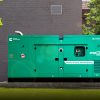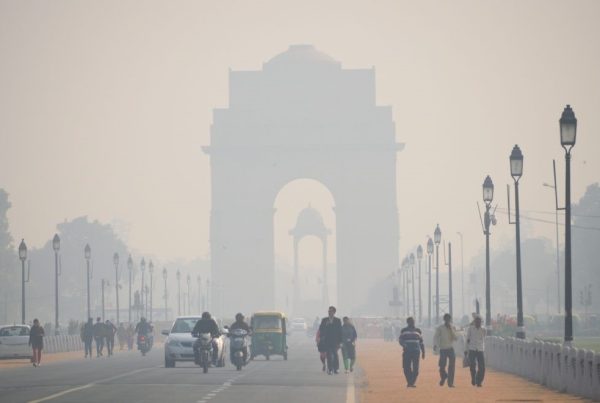Delhi’s air quality has been among the most hazardous in the world for over a decade, with a notable decline since the early 2010s. In November 2024, the Central Pollution Control Board (CPCB) recorded an Air Quality Index (AQI) exceeding 400, categorized as “severe,” underscoring the alarming state of the capital’s air. This issue is not confined to Delhi alone, several other cities across India struggle with similar challenges. The smog-filled skies, now a year-round struggle, demand immediate and sustainable solutions. At the heart of this transformation lies the importance of green energy adoption, a pivotal step toward reclaiming clean breathable air and securing a healthier future in cities with Delhi’s air quality
Understanding the Green Energy Adoption in Present-day Delhi
Delhi’s push for cleaner air reflects significant progress in renewable energy adoption, highlighting its role in combating urban pollution. Renewable energy now accounts for over one-third of the city’s electricity consumption, with sources like solar, wind, hydro, and waste-to-energy collectively contributing approximately 2,775 MW of the total power consumed. This shift is an environmental milestone and a reflection of the evolving mindset around sustainable urban living.
Solar power has emerged as a star player in this transition, with its capacity in Delhi’s energy procurement growing by an impressive 400% over the past five years. Rooftop installations supported by initiatives like the Delhi Solar Energy Policy 2023, are transforming the city’s energy landscape.
These advancements highlight that green energy adoption is an essential commitment to cleaner air and a sustainable future for Delhi, with the focus now on scaling efforts to tackle urban pollution effectively.
Delhi’s Smog Situation: An Urgent Call for Immediate, Sustainable Actions
The recurring smog in Delhi is a public health emergency. Air pollution levels during winter months, especially post the festive season, routinely hit the “hazardous” category. This causes respiratory issues, cardiovascular problems, and reduced life expectancy. Vehicular emissions, industrial pollutants, and crop stubble burning are key contributors. Addressing them requires a comprehensive approach centered on green energy solutions.
Investing in renewable energy directly impacts these sources of pollution. For instance, electric vehicles powered by solar or wind, i.e., renewable energy sources reduce vehicular emissions, while waste-to-energy plants tackle agricultural and municipal waste effectively. Immediate and large-scale adoption of green energy is the only sustainable path forward for Delhi.
The Potential of Green Energy Solutions to Further Improve Delhi’s Air Quality
Delhi’s air quality crisis demands immediate and innovative solutions to combat the persistent smog that chokes the city year-round. Green energy solutions hold immense promise in addressing the root causes of this pollution by offering cleaner alternatives to traditional, emission-heavy practices.
Green energy solutions, such as solar farms and rooftop installations utilize abundant sunlight to generate clean electricity, replacing fossil fuel-based power sources. This transition significantly reduces harmful emissions. Additionally, advanced energy storage systems ensure a steady power supply, even during cloudy days, making renewable energy reliable for urban usage. Open access opportunities enable installation of renewable energy sources in other parts of the country where such resources are abundant, and the energy being consumed in the capital.
Green hydrogen and ammonia technologies are emerging as transformative solutions for reducing emissions in hard-to-abate sectors like industry and transportation. Decarbonizing these processes helps minimize pollutants that contribute to smog formation. Similarly, waste-to-energy plants tackle Delhi’s growing waste crisis and generate clean power, further reducing reliance on fossil fuels. By investing in these green energy solutions, Delhi can lead the charge towards reduced smog, setting a powerful example for other cities in India. This shift improves air quality and supports sustainable urban living and energy independence.
Jakson Group’s Role in Leading Transformation through Green Energy Solutions
Transforming Delhi’s air quality and fostering sustainable urban living demands holistic efforts integrating advanced energy solutions across multiple domains. Jakson Group, with our diverse business verticals, has been steadfastly advancing India’s transition to a cleaner and greener future.
Jakson Group is leading the way toward a greener future by delivering eco-friendly power solutions such as CPCB IV+ compliant gensets. Our strong solar rooftop portfolio of over 300 MW+ further contributes to sustainability, by preventing over 250,000 tons of CO2 emissions annually. Our in-house manufacturing capacity of 1,200 MW+ (being further expanded to 2,000 MW+) as well as upcoming solar cell manufacturing capacity of 2,500 MW, further indicate our dedication to green & sustainable initiatives. We continue to build sustainable infrastructure that meets today’s needs by adopting cutting-edge technologies such as green hydrogen, ammonia production, and utility-scale energy storage. Together, these integrated efforts position the Jakson Group as a key enabler of sustainable energy solutions for Delhi and cities across India, fostering cleaner air and setting a benchmark for collaborative green energy adoption.









